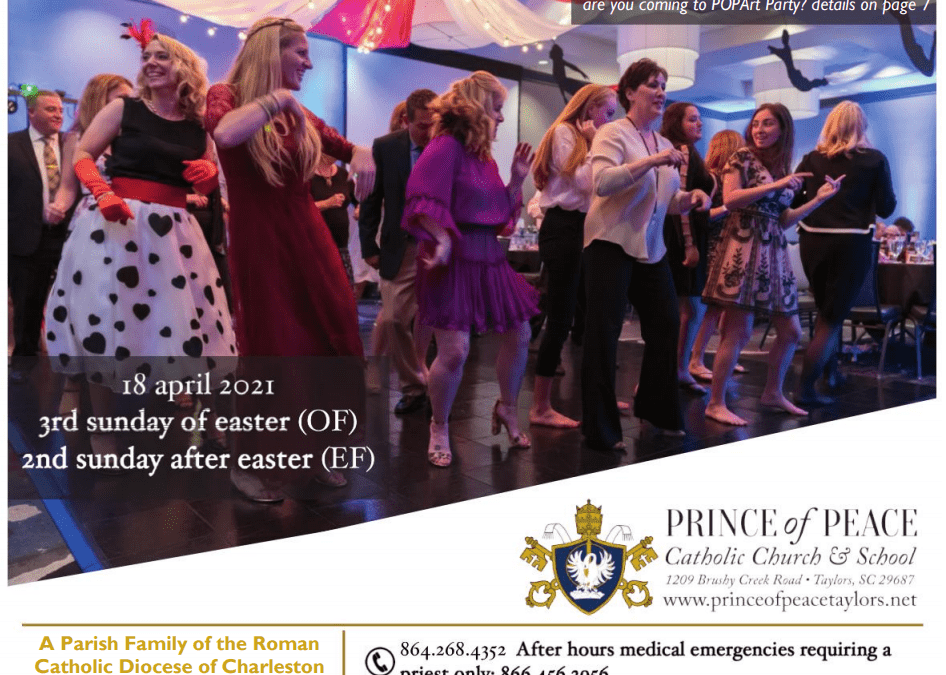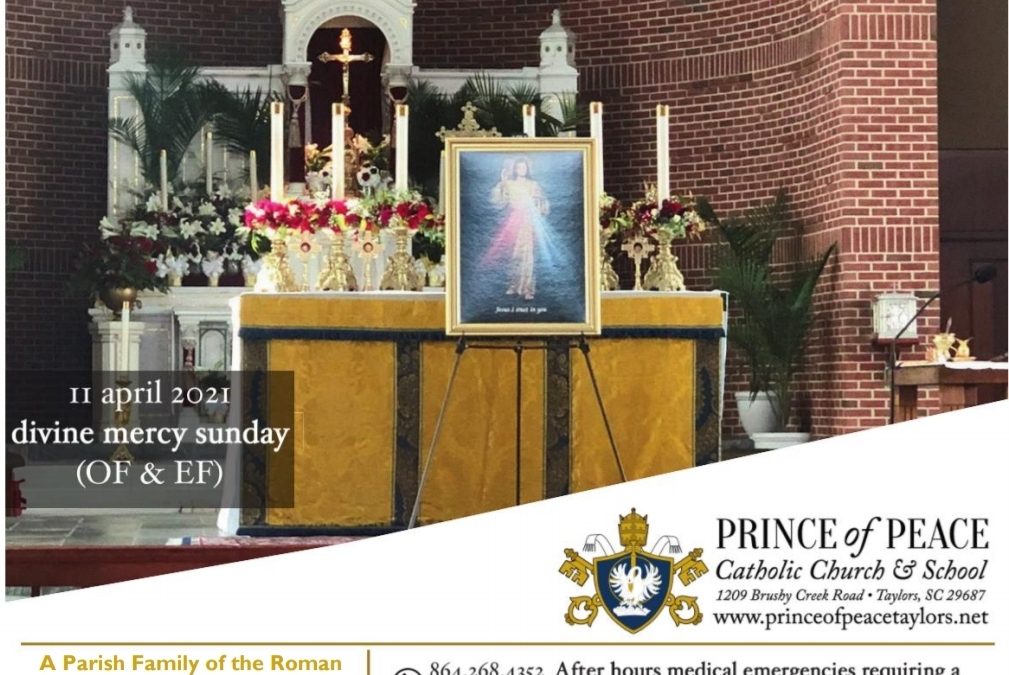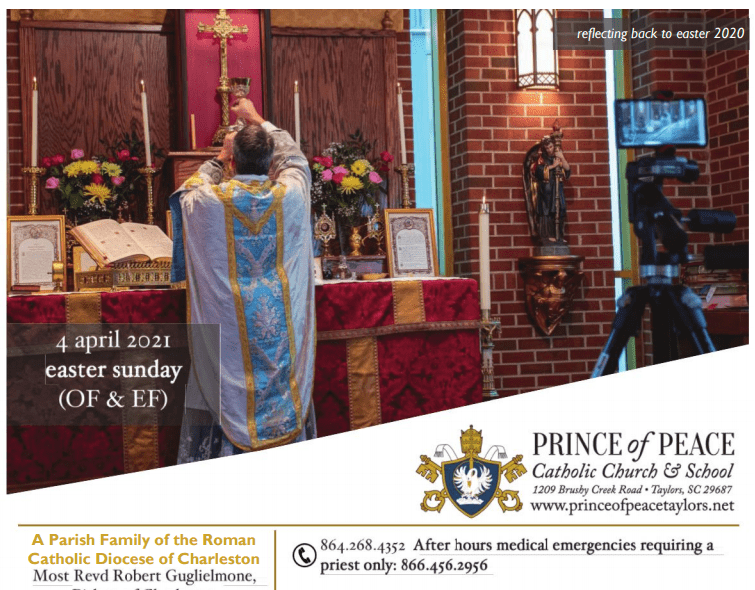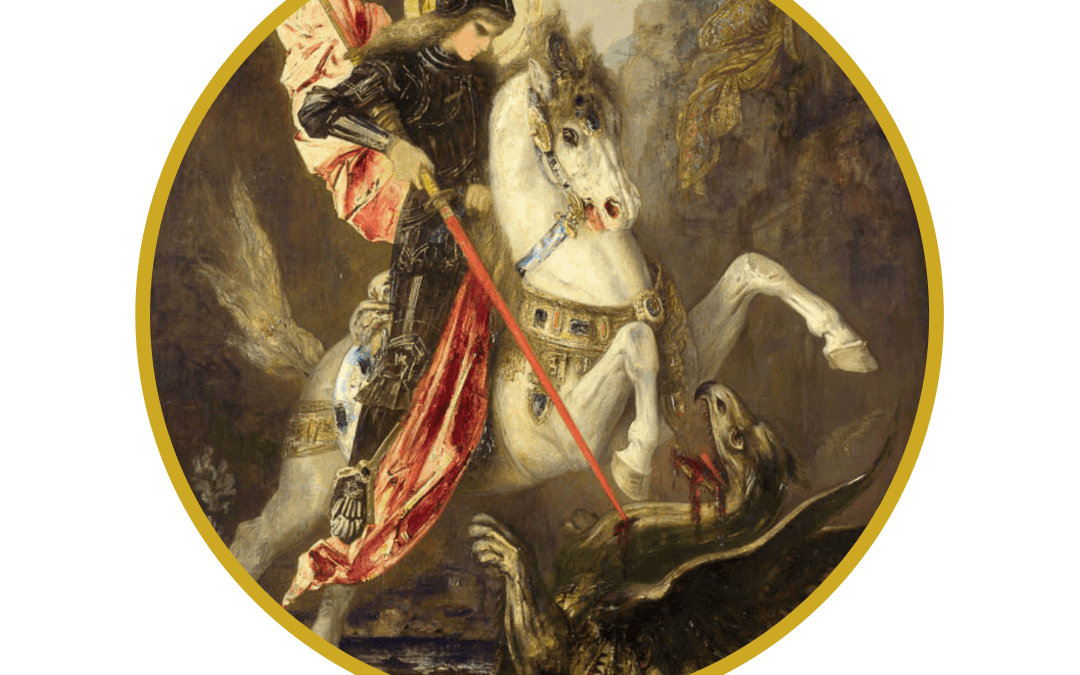
18 April 2021 Bulletin
Click to read the 18 April 2021 Bulletin

Click to read the 18 April 2021 Bulletin

Click to read the 11 April 2021 Bulletin

Click to read the 4 April 2021 Bulletin (Easter)

23 April: Feast of Saint George. George was born the son of a Roman officer and a Greek native of Lydda. Both were Christians from noble families and George was raised to follow their faith. When George was old enough, he joined Diocletian’s army. By his late 20’s, George became a Tribunus and served as an imperial guard for the Emperor at Nicomedia. In 303 A.D., Diocletian, who hated Christians, announced that every Christian would be arrested and every soldier should offer a sacrifice to the Roman gods. George refused to abide by the order and told Diocletian, who was angry but valued his friendship with George’s father. When George publicly announced his beliefs before his peers, Diocletian was forced to take action. In an effort to save George, Diocletian tried to convert him to believe in the Roman gods. He even bribed him with land, money, and slaves in exchange for offering a sacrifice to the gods. Diocletian kept this up, making several other offers but George refused them all. Finally, after exhausting all other options, Diocletian ordered George’s execution. In preparation for his death, George gave his money to the poor. Then, he was forced to endure several torture sessions. In one of these sessions, he was lacerated on a wheel of swords and required resuscitation three times. Despite all of the intense suffering, George did not waver in his Faith or turn away from God. On April 23, 303 A.D., George was beheaded. Saint George is honored as a brave martyr for his Faith. Interestingly, Saint George is known and revered by both Muslims and Christians. Saint George is the patron saint of England and Catalonia and his cross can be found throughout England. He is also the patron saint of soldiers and Boy Scouts. In older works, Saint George is depicted wearing armor and holding a lance or fighting a dragon, representing Christ’s enemies.
Now, what about the famous story of Saint George and the Dragon? Legends and stories abound that tell of George fighting dragons. They are believed to be more fable than fact. The Western version of these tales tells of a “dragon” (or crocodile?!) that made its nest at a spring that provided water for a village. The people of that town were unable to collect water due to the danger. They attempted unsuccessfully to remove the dragon from its nest. The beast would temporarily leave when they offered it a sheep or other such temptation. This worked until all the town’s sheep were eaten. The desperate people then decided that offering the beast a maiden was necessary. The townspeople chose the victim by drawing straws. One day, the princess’ straw was drawn. The monarch begged for her to be spared but the people would not have it. She was offered to the dragon, but before she could be devoured, Saint George appeared. He faced the dangerous beast, protected himself with the Sign of the Cross, and slayed the dragon. George then gave a rousing sermon and the townspeople abandoned their paganism and were converted to Christianity. Given a large reward by the king, George distributed it to the poor, then rode away. It is said that Saint George killed the dragon near the sea in Beirut. Thus, Saint George Bay was named in his honor.
Ideas for celebrating this feast at home:


11 April: Divine Mercy Sunday. In the 1930’s Christ appeared to Sister Faustina Kowalska, a Sister of Mercy in Poland. Our Lord asked her to paint an image from the vision she saw. The image was of Jesus with a red and blue ray coming out of his heart (symbolizing water and blood). Christ told Faustina, “I want the image to be solemnly blessed on the first Sunday after Easter, and I want it to be venerated publicly so that every soul may know about it.” St. Faustina was told to sign the Image “Jesus, I trust in you!” In 1934, a painting of the image was completed. In 2000, Saint Pope John Paul II proclaimed the Second Sunday of Easter as Divine Mercy Sunday. Along with the image, Jesus also gave Saint Faustina a prayer called The Divine Mercy Chaplet. The Chaplet is prayed using the rosary. Those who pray the chaplet receive abundant graces and promises of mercy from Our Lord. Sister Faustina was canonized a saint on April 30, 2000. To celebrate Divine Mercy Sunday at home: pray the Divine Mercy Chaplet. Attend confession the week of Divine Mercy (read about the special graces received with it here.) Find Divine Mercy craft ideas here. Enjoy Divine Mercy “Sundaes” with ice cream and toppings (see idea here). Eat a polish meal (kielbasa, pierogies, etc.) in honor of St. Faustina and St. JPII (who was a great advocate of this devotion).
12 April: Feast of Saint Zeno. This little-known saint was born in the fourth century in Africa. He founded the first church in the city of Verona, Italy. Zeno was a bishop there for ten years. He baptized many, won converts back from Arianism, lived a life of poverty, trained priests, and set up a convent. Tradition says he fished in the Adige River. Saint Zeno is the patron of fishermen and is invoked to help infants speak and walk. To celebrate Saint Zeno at home: definitely enjoy a fish dinner! Treat your children to “Swedish fish” candy for dessert and tell them about this saint who loved to fish and fought to share the Gospel in a pagan world. Because Zeno spent much of his life in Italy, you could also enjoy an Italian dinner. Another fun way to celebrate the life of Saint Zeno would be to go on a family fishing expedition.
16 April: Feast of Saint Bernadette Soubirous. Bernadette was born in Lourdes, France in 1844. Her family lived in extreme poverty and Bernadette suffered from illnesses most of her life. At age fourteen, the Virgin Mary appeared to her near a cave at Massabielle. This was the first of eighteen apparitions. Mary identified herself as “The Immaculate Conception.” When Bernadette told of these visions, many didn’t believe and demanded she be put in an asylum. Bernadette remained firm and shared Mary’s message of the need for prayer and penance. The vision told her to “drink of the water of the spring, wash in it, and eat the herb that grew there”. Bernadette obeyed and the next day the grotto was transformed from a muddy mess to clear flowing water. Bernadette insisted that “the Lady” asked for a chapel to be built there. Today, close to 5 million pilgrims visit Lourdes each year to pray and to drink the miraculous water. Countless miracles have come from the waters. When Bernadette was twenty-two, she chose to withdraw from the world to the convent of Saint-Gildard with the Sisters of Charity of Nevers. She stayed there until her death in 1879. The name “Bernadette” means “brave as a bear.” To celebrate this feast: pray a family rosary together! Use this day to revive your family’s devotion to the Blessed Mother. Give gummy bears as a treat to remind your children to be “brave as a bear” like Bernadette in sharing their faith. Watch one of the St. Bernadette movies on FORMED. Eat croissants for breakfast and prepare a French-themed dinner: perhaps a charcuterie board with cheeses and breads. Or, French onion soup and a chocolate soufflé dessert. Or, keep it crazy simple and enjoy “French” fries in memory of this humble French girl who became such an important saint.
Recent Comments